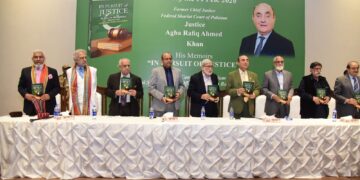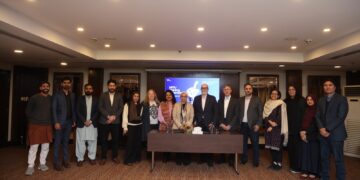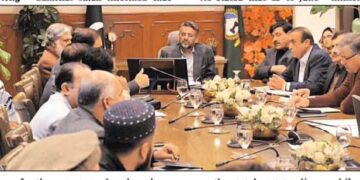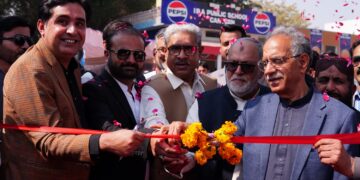Emphasizing on the need of sufficient allocation of annual budget for girls education to bridge the gap, the education experts have discussed and suggested the important steps that Punjab government should take for better governance and increased financing in education sector.
The recommendations and concerns were put forward by the leading education experts during a pre-budget consultation meeting in Punjab with particular focus on Girl’s Education, organized by the Awaz CDS Pakistan in collaboration with Education Champions Network Pakistan and Pakistan Coalition for Education.The purpose was to enable practitioners and experts to share their recommendations for the budget allocation at the provincial level and become a part of the budget making process.
Pre-budget consultative meeting brought together government officials, experts, civil society representatives, prominent academics to provide input in the upcoming Punjab provincial budget 2022-23.
The panellists included Economist University of Central Punjab Lahore, Prof. Dr. Qais Aslam, CEO of Rah-Center for Management and Development, Fauzia Viqar, Additional Secretary (Budget & Planning) School Education Department Punjab, Qaiser Rashid, Director General (Parliamentary Affairs & Research) Provincial Assembly of the Punjab Inayat Ullah Lak, MPA Punjab Assembly and Chairperson Standing Committee on Gender Mainstreaming , Uzma Kardar.
Starting the session, CEO Awaz CDS Pakistan, Mohammad Zia ur Rehman said that, we should enhance the capacities of departments at district level so they can utilize and report the budgets efficiently. He also advocated to notify and implement free and compulsory education Act in Punjab.
Zehra Arshad, Executive Director Pakistan Coalition for Education (PCE), emphasized the need of putting extra efforts in education sector from allocations to spending especially in time of post Covid situation where the number of OOSC has already been exacerbated.
Marium Amjad Khan-Campaign Manager-AwazCDS-Pakistan presented the recommendations prepared by Education Champion Network on the education sector in Punjab. She highlighted the steps need to be taken not just for increasing girls enrolment but also their retention in schools. Some of the key recommendations focused around awareness raising on the importance of girls’ education, ensuring safe access to and a safe environment, investing in teachers trainings, introducing innovations in the field of education and making the education system shock/emergency resilient.
Ayesha Iqbal , MPA Punjab Assembly, suggested to take all PEIMA and PEF schools under one umbrella to minimize the expenses on bureaucracy and other unnecessary expenditures. She added that it will also help in making systems accountable.
Ms. Uzma Kardar, MPA Punjab Assembly and Chairperson Standing Committee on Gender Mainstreaming, expressed that planning budgets from gender lens is very important but while budgeting it is also important to synchronize it with SDGs 4 targets, each target will share how much investment is required. She appreciated the concept of Insaaf Afternoon Schools and suggested “Girls Friendly Toilets”.
Dr. Qais Aslam, Economist University of Central Punjab Lahore, suggested Government should build more schools at all levels with modern facilities and upgrade existing schools from primary to high schools. He emphasized that textbooks should encourage research based gender sensitive, environment sensitive and productivity orientated knowledge.
Qaisar Rashid, Additional Secretary (Budget & Planning) School Education Department Punjab, stressed on the importance of quality education and shared that Government is serious about STEM education and the Ed-tech policy is also approved which will help us in training our teachers on blended learning.
A large number of participants including representatives from different NGOs, media organizations, academia, schools councils, lawyers and youth also shared their opinions and inputs during an open session.
Fauzia Viqar, CEO of Rah-Center for Management and Development, concluded the session and suggested that the role of parliamentarians is very important and they should be given ample time to review and debate on budgets. She also suggested GIS mapping should be introduced in all private schools to make teachers accountable and to avoid GHOST schools. She further recommended that the number of special education schools should be increased and judicious budgets should be allocated to them.



















